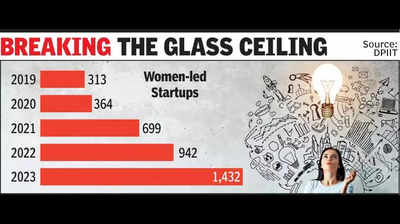
Ahmedabad: Gujarat is fast emerging as a thriving hub for women-led startups. In 2023, the state recorded an impressive 52% rise in women-led startups, with 1,432 new ventures registered compared to 942 in 2022, according to data by the department of promotion for industry and internal trade (DPIIT), recently tabled in Parliament.
A case in point is Archana Thosar, co-founder of Green Maneuver Industries LLP, who launched her startup to manufacture biodegradable packaging made of cornflour and starch derivatives as a green alternative to plastic.
“We were book positive six months into starting our firm. Under the Credit Guarantee Fund Trust for Micro and Small Enterprises (CGTMSE), we also received credit, which is helping us scale up by meeting our working capital and equipment needs. So far, we haven’t needed to dilute equity to raise funds,” said Archana, who worked for two decades in the banking sector before starting her startup.
Similarly, Amounee, an e-commerce marketplace run by Megha Das, has been incubated at iHub and connects rural artisans and weavers with global buyers. The startup empowers micro-entrepreneurs by offering a platform that showcases authentic, govt-certified crafts with geographical indications.
From textiles to technology, pharmaceuticals to handicrafts, women entrepreneurs in Gujarat are rewriting the business rulebook, driven by policy support, shifting family dynamics, and better access to education and mentorship opportunities.
Sunil Parekh, a veteran startup ecosystem expert, said, “Over the past couple of years, there has been a marked shift in the number of women taking the entrepreneurial plunge. In the past two decades, both access to education and opportunities for women improved. Families have become more supportive, empowering women to pursue independent decision-making. A combination of these two factors drove a cultural evolution in Gujarat, with more young women remaining at the helm of affairs in startups.”
“At the same time, several middle-aged women who are well-experienced professionals are now also taking the plunge. Being unable to leave families behind to pursue a career is indeed a thing of the past now. In fact, many women are making conscious choices to remain single to pursue what they’re passionate about,” said Parekh.
This transformation is not confined to urban hubs but is also visible in peri-urban and rural areas. Women are leading sectors such as textiles, e-commerce, healthcare, and pharmaceuticals, and are making strides in enabling industries through tech and logistics.
Easy access to funding and additional incentives available to women are also among the reasons leading to a surge in the number of women-led startups here.
“Of some 536 startups incubated at iHub at present, about 174 are women-led, accounting for 32% of the total startups supported here. Ecosystem enablers like iHub are playing a key role in nurturing women entrepreneurs by providing tailored mentorship and pitching opportunities, which also fuels the rise of startups here,” said Hiranmay Mahanta, CEO of iHub, which has women-led startups in agriculture, deep tech, edtech, healthcare, and FMCG sectors, among others.
Talking about the role of govt policies, Pathik Patwari, Chairperson of the Indian Chamber of Commerce (ICC) – Gujarat, said, “The Startup India initiative is helping women gain access to finance, technology, and market linkages. Reduced compliance burdens, coupled with targeted policies, have further encouraged women entrepreneurs to participate in the state’s thriving startup scene.”





